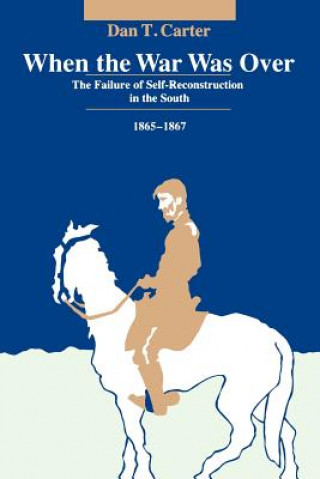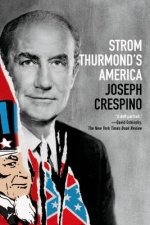
Kód: 11527008
When the War Was Over
Autor Dan T. Carter
Emory historian Carter, author of the classic Scottsboro: A Tragedy of the American South (1969), has painstakingly examined a subject on which there is near-unanimity - the failure of postwar Southern leadership in the brief peri ... celý popis
- Jazyk:
 Angličtina
Angličtina - Vazba: Brožovaná
- Počet stran: 369
Nakladatelství: Louisiana State University Press, 1985
- Více informací o knize

Mohlo by se vám také líbit
-

George Wallace
689 Kč -

Strom Thurmond's America
456 Kč -

President Like No Other
519 Kč
Darujte tuto knihu ještě dnes
- Objednejte knihu a zvolte Zaslat jako dárek.
- Obratem obdržíte darovací poukaz na knihu, který můžete ihned předat obdarovanému.
- Knihu zašleme na adresu obdarovaného, o nic se nestaráte.
Více informací o knize When the War Was Over
Nákupem získáte 75 bodů
 Anotace knihy
Anotace knihy
Emory historian Carter, author of the classic Scottsboro: A Tragedy of the American South (1969), has painstakingly examined a subject on which there is near-unanimity - the failure of postwar Southern leadership in the brief period of mild Presidential Reconstruction (1865-67) - in order to make a slight but significant correction: the leaders were not die-hard Rebels (or plantation elite) but conservatives of varied background; a substantial number were ready to support industrial development and ("even more surprisingly") development of efficient small-scale farming. But they were undone by ingrained Southern fear-and-dread of blacks, which manifested itself in terror of insurrection; by failure to anticipate Northern shock at the coercive Black Codes of 1865-66; and by Democrat Johnson's alienation of Republican congressional moderates in then vetoing civil rights legislation. (The outcome: Congressional or Black Reconstruction.) Carter develops this argument on several fronts. One is the nature of the leadership: Johnson's seven Southern gubernatorial appointees were neither secessionists (all had opposed secession until late 1860) nor Union loyalists (i.e., they were generally acceptable to the South); more crucially, the white Southerners elected to Congress in the fall of 1865 - and denied seats - were not unreconstructed RebeLs every one (as charged by W.E.B. Du Bois and repeated by historians since) but a conservative mix (of whom "only seven had been secessionists"). On another front, white Southern willingness "to accept almost any form of government that would bring order to a disordered land" was overborne by a tradition of extra-legal repression and Johnson's lack of clear, firm racial policies. Finally, economic self-reconstructionists faced many a dilemma: if, for instance, states repudiated their debts (as the federal government demanded), what would happen to private debts? if private debtors were allowed to postpone repayment (as impoverished citizens demanded), would this not delay recovery? In shading the usual grim picture, Carter confesses himself more depressed: the best that moderate, practical, conciliatory Southerners could do was not very much. As a revised interpretation, however, this has ramifications for any treatment of the Reconstruction period - even one as cut-and-dried as Burke Davis' The Long Surrender (below). (Kirkus Reviews)
 Parametry knihy
Parametry knihy
749 Kč
- Plný název: When the War Was Over
- Podnázev: The Failure of Self-Reconstruction in the South, 1865--1867
- Autor: Dan T. Carter
- Jazyk:
 Angličtina
Angličtina - Vazba: Brožovaná
- Počet stran: 369
- EAN: 9780807112045
- ISBN: 0807112046
- ID: 11527008
- Nakladatelství: Louisiana State University Press
- Hmotnost: 460 g
- Rozměry: 151 × 228 × 24 mm
- Datum vydání: 01. April 1985
Oblíbené z jiného soudku
-

Dune
216 Kč -

Haunting Adeline
621 Kč -

Berserk Deluxe Volume 2
1092 Kč -

White Nights
89 Kč -

Powerless
268 Kč -

Atomic Habits
330 Kč -

Dune Messiah
228 Kč -

Berserk Deluxe Volume 3
1142 Kč -

One Day
221 Kč -

Berserk Deluxe Volume 1
1115 Kč -

Iron Flame
368 Kč -

Surrounded by Idiots
213 Kč -

Harry Potter and the Prisoner of Azkaban (Minalima Edition)
993 Kč -

Gravity Falls Journal 3
443 Kč -

Heaven Official's Blessing: Tian Guan Ci Fu (Novel) Vol. 1
440 Kč -

The Creative Act
568 Kč -

Dune
276 Kč -

Hunting Adeline
624 Kč -

A Little Life
290 Kč -

Children of Dune
230 Kč -

Heaven Official's Blessing: Tian Guan Ci Fu (Novel) Vol. 2
427 Kč -

Bungo Stray Dogs, Vol. 8 (light novel)
383 Kč -

Percy Jackson and the Olympians 5 Book Paperback Boxed Set
944 Kč -

Solo Leveling, Vol. 1
440 Kč -

The Prisoner's Throne
247 Kč -

Court of Thorns and Roses
268 Kč -

Cry Baby Coloring Book
276 Kč -

Fourth Wing
407 Kč -

Icebreaker
199 Kč -

Berserk Deluxe Volume 6
1089 Kč -

Avatar, the Last Airbender: The Kyoshi Novels (Box Set)
986 Kč -

The 48 Laws of Power
601 Kč -

House of Leaves
611 Kč -

Twisted Lies
213 Kč -

Dune Messiah
272 Kč -

No Longer Human
359 Kč -

48 Laws Of Power
331 Kč -

Twisted Games
213 Kč -

Caraval Paperback Boxed Set
902 Kč -

Solo Leveling, Vol. 2
468 Kč -

Open Circuits
907 Kč -

Berserk Deluxe Volume 5
1119 Kč -

Heaven Official's Blessing: Tian Guan Ci Fu (Novel) Vol. 3
476 Kč -

Berserk Deluxe Volume 4
1125 Kč -

Court of Mist and Fury
206 Kč -

SOLO LEVELING V08
436 Kč -

English File Upper Intermediate Multipack A (4th)
531 Kč -

CHAINSAW MAN V14
251 Kč -

Before the Coffee Gets Cold
184 Kč
Osobní odběr Praha, Brno a 12903 dalších
Copyright ©2008-24 nejlevnejsi-knihy.cz Všechna práva vyhrazenaSoukromíCookies



 Vrácení do měsíce
Vrácení do měsíce 571 999 099 (8-15.30h)
571 999 099 (8-15.30h)